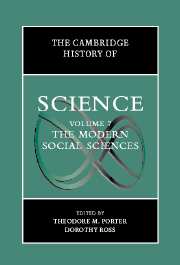Book contents
- Frontmatter
- 1 Introduction: Writing the History of Social Science
- PART I SCIENCES OF THE SOCIAL TO THE LATE NINETEENTH CENTURY
- 2 Genres and Objects of Social Inquiry, From the Enlightenment to 1890
- 3 Social Thought and Natural Science
- 4 Cause, Teleology, and Method
- 5 Utopian Socialism And Social Science
- 6 Social Surveys in the Eighteenth and Nineteenth Centuries
- 7 Scientific Ethnography and Travel, 1750–1850
- 8 History and Historicism
- 9 Bringing the Psyche into Scientific Focus
- 10 Continental Political Economy From the Physiocrats to the Marginal Revolution
- 11 British Economic Theory From Locke To Marshall
- 12 Marx and Marxism
- PART II THE DISCIPLINES IN WESTERN EUROPE AND NORTH AMERICA SINCE ABOUT 1880
- PART III THE INTERNATIONALIZATION OF THE SOCIAL SCIENCES
- PART IV SOCIAL SCIENCE AS DISCOURSE AND PRACTICE IN PUBLIC AND PRIVATE LIFE
- Index
- References
3 - Social Thought and Natural Science
from PART I - SCIENCES OF THE SOCIAL TO THE LATE NINETEENTH CENTURY
Published online by Cambridge University Press: 28 March 2008
- Frontmatter
- 1 Introduction: Writing the History of Social Science
- PART I SCIENCES OF THE SOCIAL TO THE LATE NINETEENTH CENTURY
- 2 Genres and Objects of Social Inquiry, From the Enlightenment to 1890
- 3 Social Thought and Natural Science
- 4 Cause, Teleology, and Method
- 5 Utopian Socialism And Social Science
- 6 Social Surveys in the Eighteenth and Nineteenth Centuries
- 7 Scientific Ethnography and Travel, 1750–1850
- 8 History and Historicism
- 9 Bringing the Psyche into Scientific Focus
- 10 Continental Political Economy From the Physiocrats to the Marginal Revolution
- 11 British Economic Theory From Locke To Marshall
- 12 Marx and Marxism
- PART II THE DISCIPLINES IN WESTERN EUROPE AND NORTH AMERICA SINCE ABOUT 1880
- PART III THE INTERNATIONALIZATION OF THE SOCIAL SCIENCES
- PART IV SOCIAL SCIENCE AS DISCOURSE AND PRACTICE IN PUBLIC AND PRIVATE LIFE
- Index
- References
Summary
Among the intellectual traditions that have helped to form modern social science, natural philosophy and natural science stand out. The emerging social sciences have also drawn in important ways from humanist philosophy, juridical scholarship, political tracts and treatises, Christian theology, travel accounts, and literary and moral essays. But the natural sciences have provided an enduring set of models for modern social science, models that go well beyond suggestive analogies and illustrative metaphors. Their formative influence was particularly salient during the period addressed here, from the Enlightenment to the last third of the nineteenth century.
In the eighteenth century, the new natural philosophy came to be seen in Europe as the most reliable and authoritative system of knowledge. Inescapably, it was considered relevant to political thought and moral philosophy as well. In its most basic form, natural philosophy meant the search for natural principles and laws, in place of supernatural agencies. Applied to the domain of moral philosophy, the naturalistic outlook generally fulfilled a similar function: It allowed for a shift away from Christian doctrines toward secular models, yet offered reliable knowledge by which one could evade the relativistic consequences of the “skeptical crisis” of the sixteenth and seventeenth centuries.
Among the traditions that grew out of this naturalistic quest for knowledge of human nature and human society was modern natural law, initiated by Hugo Grotius (1583–1645). It provided the predominant general framework for questions of state and society during the seventeenth and much of the eighteenth centuries. Natural law theorists like Thomas Hobbes (1588–1679) and Samuel Pufendorf (1632–1694) developed elaborate systems of moral duty and political obligation based upon what they took to be permanent features of human nature, such as the concern for self-preservation.
- Type
- Chapter
- Information
- The Cambridge History of Science , pp. 40 - 56Publisher: Cambridge University PressPrint publication year: 2003
References
- 8
- Cited by

